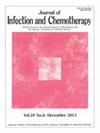新一代测序在异基因造血干细胞移植后活动性肺结核诊断中的帮助:一个病例系列。
IF 1.9
4区 医学
Q3 INFECTIOUS DISEASES
引用次数: 0
摘要
对于接受造血干细胞移植的患者来说,结核病是一种罕见但威胁生命的并发症。在2020年1月至2024年1月的病例系列中,我们评估了元基因组下一代测序在异体造血干细胞移植后结核病早期诊断中的应用。我们发现了 9 例移植后结核病,主要是肺结核,其中 1 例为播散性疾病。在移植后活动性结核病患者的早期液体样本中,元基因组下一代测序比传统检测更早地检测到结核分枝杆菌复合体,从而实现了快速诊断。在这项研究中,元基因组新一代测序的灵敏度为 66.6%,特异性为 100%,高于 TB-DNA 和 Xpert(55.6%)。同时,在 mNGS 阳性样本中,有 4 份(44.4%)来自外周血,3 份(33.3%)来自支气管肺泡灌洗液。元基因组下一代测序与 Xpert 的结合可提高检测移植后患者肺外标本中结核分枝杆菌复合体的能力。从症状出现到下一代测序阳性的时间为 2 到 76 天,从移植到确诊结核病的时间为 30 到 485 天。尽管出现了一些死亡病例,但大多数患者都完成了延长的抗结核治疗并接受了定期随访,这凸显了下一代测序技术在这一高风险人群中诊断结核病的价值。本文章由计算机程序翻译,如有差异,请以英文原文为准。
Next-generation sequencing assistance in the diagnosis of active tuberculosis following allogeneic hematopoietic stem cell transplantation: A case series
Tuberculosis poses a rare but life-threatening complication for patients undergoing hematopoietic stem cell transplantation. In a case series spanning January 2020 to January 2024, we evaluated the application of metagenomic Next-Generation Sequencing in the early diagnosis of tuberculosis in patients following allogeneic hematopoietic stem cell transplantation. We identified 9 cases of post-transplant tuberculosis, predominantly pulmonary, with 1 case of disseminated disease. In early fluid samples from patients with post-transplant active tuberculosis, metagenomic next-generation sequencing detected Mycobacterium tuberculosis complex earlier than conventional tests, enabling rapid diagnosis. In this study, metagenomic next-generation sequencing showed a sensitivity of 66.6 % and specificity of 100 %, higher than TB-DNA and Xpert (55.6 %). Concurrently, among mNGS-positive samples, 4 (44.4 %) were from peripheral blood and 3 (33.3 %) from bronchoalveolar lavage fluid. The combination of metagenomic Next-Generation sequencing and Xpert may enhance the capacity for detecting Mycobacterium tuberculosis complex in extrapulmonary specimens from post-transplant patients. The time from symptom onset to Next-Generation Sequencing positivity was 2–76 days, and from transplantation to TB diagnosis was 30–485 days. Despite some fatalities, the majority of patients completed extended anti-tuberculosis treatment and are under regular follow-up, highlighting the value of Next-Generation Sequencing in diagnosing tuberculosis in this high-risk population.
求助全文
通过发布文献求助,成功后即可免费获取论文全文。
去求助
来源期刊

Journal of Infection and Chemotherapy
INFECTIOUS DISEASES-PHARMACOLOGY & PHARMACY
CiteScore
4.10
自引率
4.50%
发文量
303
审稿时长
47 days
期刊介绍:
The Journal of Infection and Chemotherapy (JIC) — official journal of the Japanese Society of Chemotherapy and The Japanese Association for Infectious Diseases — welcomes original papers, laboratory or clinical, as well as case reports, notes, committee reports, surveillance and guidelines from all parts of the world on all aspects of chemotherapy, covering the pathogenesis, diagnosis, treatment, and control of infection, including treatment with anticancer drugs. Experimental studies on animal models and pharmacokinetics, and reports on epidemiology and clinical trials are particularly welcome.
 求助内容:
求助内容: 应助结果提醒方式:
应助结果提醒方式:


